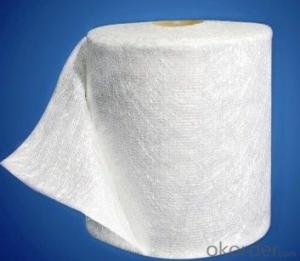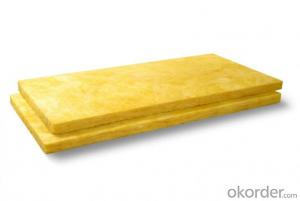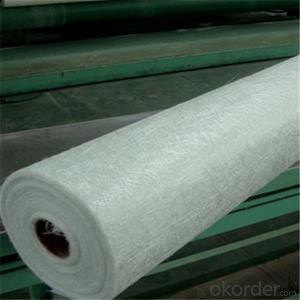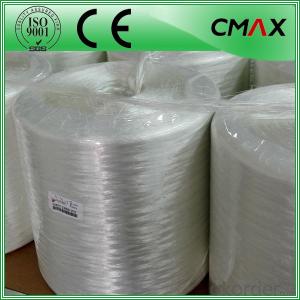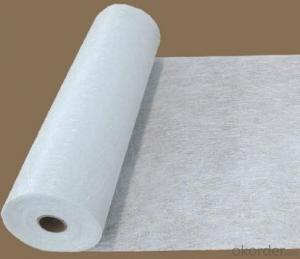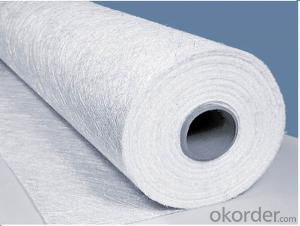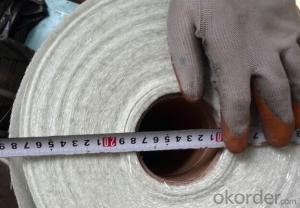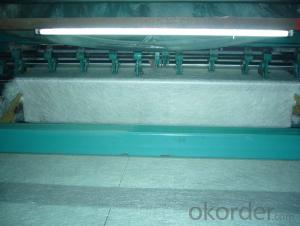Fiberglass Mat Tissue E-Glass Stitched Chopped Strand Mat for FRP Boat and Tube
- Loading Port:
- China Main Port
- Payment Terms:
- TT or LC
- Min Order Qty:
- -
- Supply Capability:
- -
OKorder Service Pledge
OKorder Financial Service
You Might Also Like
1.Brief Introduction
E Glass Stitched Chopped Mat is made by chopping continuous strands into chopped strands and stitching them together. The product has a maximum width of 110 inches. The products can be used in various fields,such as FRP industry.
2.Product Features
Fast breakdown in styrene
Good wet-through and fast wet-out in resins, rapid air lease
Cost saving and worthwhile.
3.Product Specifications
Item | Over Density | Moisture Content | Chop Density | Polyester Yarn | Width |
(g/m2) | (%) | (g/m2) | (g/m2) | (mm) | |
EMK300 | 309.5 | ≤0.15 | 300 | 9.5 | 50-3300 |
EMK380 | 399 | 380 | 19 | ||
EMK450 | 459.5 | 450 | 9.5 | ||
EMK450 | 469 | 450 | 19 | ||
EMC0020 | 620.9 | 601.9 | 19 | ||
EMC0030 | 909.5 | 900 | 9.5 |
Special specification can be produce according to customer requirements.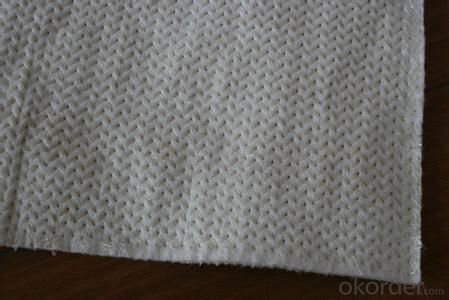
4.FAQ
Storage:
Unless otherwise specified, E-Glass Stitched Chopped Strand Mat should be stored in a dry, cool and rain-proof area. It is recommended that the room temperature and humidity should be always maintained at 15℃~35℃ and 35%~65% respectively.
- Q: How does fiberglass mat tissue perform in terms of air permeability?
- Fiberglass mat tissue has low air permeability, meaning it restricts the flow of air.
- Q: Are there any health risks associated with fiberglass mat tissue?
- Yes, there are potential health risks associated with fiberglass mat tissue. Fiberglass is made of tiny glass fibers that can be released into the air when the material is cut, sanded, or disturbed. When inhaled, these fibers can cause irritation to the skin, eyes, and respiratory system. Short-term exposure may result in symptoms such as coughing, wheezing, and difficulty breathing. Long-term exposure to fiberglass fibers has been linked to more serious health issues, including lung damage and an increased risk of developing respiratory conditions such as asthma or bronchitis. It is important to take proper precautions, such as wearing protective clothing, goggles, and a mask, when working with fiberglass mat tissue to minimize the risk of exposure and potential health problems.
- Q: How does fiberglass mat tissue perform in high temperatures?
- Fiberglass mat tissue performs well in high temperatures due to its inherent heat resistance properties. The mat is typically made from glass fibers that are woven together, creating a strong and durable material. These glass fibers have a high melting point, allowing the fiberglass mat tissue to withstand elevated temperatures without deforming or losing its structural integrity. When exposed to high temperatures, fiberglass mat tissue does not shrink, warp, or become brittle like other materials might. It retains its dimensional stability and mechanical strength, making it suitable for various applications in industries such as automotive, aerospace, construction, and insulation. Additionally, fiberglass mat tissue acts as a thermal insulator, offering protection against heat transfer. It can effectively resist heat conduction and radiation, helping to maintain the desired temperature in a given environment or prevent heat damage to surrounding components. Furthermore, fiberglass mat tissue is non-combustible, meaning it does not burn or produce toxic gases when exposed to fire. This makes it a reliable choice for applications that require fire resistance, such as fireproofing insulation or protective barriers. In summary, fiberglass mat tissue performs exceptionally well in high temperatures. Its heat resistance, dimensional stability, mechanical strength, thermal insulation properties, and non-combustible nature make it an excellent material for use in demanding environments where elevated temperatures are present.
- Q: Can fiberglass mat tissue be used for insulating concrete forms (ICFs)?
- Yes, fiberglass mat tissue can be used for insulating concrete forms (ICFs). Fiberglass mat tissue acts as a reinforcement layer that can be applied directly to the surface of ICFs. It helps to provide additional strength and durability to the concrete, while also enhancing the insulation properties of the ICF system. The fiberglass mat tissue is typically embedded in a thin layer of adhesive or mortar, which helps to bond it to the ICF surface. This combination of fiberglass mat tissue and adhesive or mortar creates a strong, insulated barrier that helps to minimize heat loss and improve energy efficiency in a building. Additionally, fiberglass mat tissue is lightweight and easy to handle, making it a convenient choice for ICF installations.
- Q: How thick is fiberglass mat tissue typically?
- Fiberglass mat tissue, also known as fiberglass mat or simply mat, typically comes in various thicknesses depending on its intended use. The thickness can range from 0.5 millimeters (mm) to as thick as 3 mm. However, the most commonly used thicknesses for fiberglass mat tissue are 1.5 mm and 2 mm. These thicknesses are ideal for applications such as reinforcing laminates, composite materials, and providing surface finishes. It is important to note that the specific thickness of fiberglass mat tissue may vary depending on the manufacturer and the specific requirements of the project.
- Q: What is the thermal conductivity of fiberglass mat tissue?
- Fiberglass mat tissue typically exhibits a low thermal conductivity, which falls within the range of 0.03 to 0.05 W/m·K. Consequently, it serves as an excellent insulator, effectively impeding the flow of heat. Its favorable insulative properties render it suitable for various applications, including thermal insulation in buildings, industrial equipment, and appliances.
- Q: Does fiberglass mat tissue provide any acoustic insulation?
- Fiberglass mat tissue does provide some degree of acoustic insulation. Due to its fibrous structure, it can absorb sound waves and reduce their transmission through walls or other surfaces. However, it is important to note that the level of acoustic insulation provided by fiberglass mat tissue may vary depending on various factors such as thickness, density, and the specific application. In some cases, additional layers or thicker materials may be required to achieve optimal acoustic insulation.
- Q: What is the maximum temperature that fiberglass mat tissue can withstand?
- The maximum temperature that fiberglass mat tissue can typically withstand is around 600-700 degrees Celsius.
- Q: What are the key properties of fiberglass mat tissue?
- The key properties of fiberglass mat tissue include high strength and durability, excellent fire resistance, good thermal insulation properties, and resistance to chemicals and moisture. Additionally, it is lightweight, easy to handle and install, and offers good dimensional stability.
- Q: Can fiberglass mat tissue be used for thermal insulation?
- Yes, fiberglass mat tissue can be used for thermal insulation. Fiberglass mat tissue is made from fine glass fibers that are woven together to form a strong and flexible material. It has excellent thermal insulation properties due to its low thermal conductivity and high resistance to heat transfer. Fiberglass mat tissue can be used to insulate walls, roofs, and other surfaces to prevent heat loss or gain. It is commonly used in the construction industry to improve energy efficiency and reduce heating or cooling costs. Additionally, fiberglass mat tissue is fire-resistant, moisture-resistant, and durable, making it suitable for various thermal insulation applications.
Send your message to us
Fiberglass Mat Tissue E-Glass Stitched Chopped Strand Mat for FRP Boat and Tube
- Loading Port:
- China Main Port
- Payment Terms:
- TT or LC
- Min Order Qty:
- -
- Supply Capability:
- -
OKorder Service Pledge
OKorder Financial Service
Similar products
Hot products
Hot Searches
Related keywords
